 MyCatBreeds
MyCatBreeds Both Tortoiseshell and Serengeti are originated from United States. Both Tortoiseshell and Serengeti are of same weight. Tortoiseshell may live 5 years more than Serengeti. Both Tortoiseshell and Serengeti has same litter size. Tortoiseshell requires Moderate maintenance. But Serengeti requires Low maintenance
Both Tortoiseshell and Serengeti are originated from United States. Both Tortoiseshell and Serengeti are of same weight. Tortoiseshell may live 5 years more than Serengeti. Both Tortoiseshell and Serengeti has same litter size. Tortoiseshell requires Moderate maintenance. But Serengeti requires Low maintenance
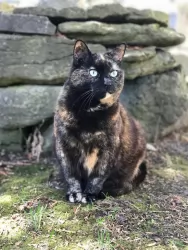 The Tortoiseshell isn’t a cat breed but rather a coat coloring of cats. It just happens that most tortoiseshell cats are females.
The Tortoiseshell isn’t a cat breed but rather a coat coloring of cats. It just happens that most tortoiseshell cats are females.
Known as Torties, these cats always have a couple of colors such as red and black as well as some fawn.
Tortoiseshell cats with the tabby pattern are referred to as Torbie cats. Tortoiseshell markings appear in many different breeds.
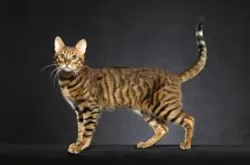 This is a cat breed that was deliberately bred to resemble the Serval cat. It was developed by crossing a Bengal cat and an Oriental Shorthair.
This is a cat breed that was deliberately bred to resemble the Serval cat. It was developed by crossing a Bengal cat and an Oriental Shorthair.
The cat was developed by biologist Karen Sausman in California in 1994. The breed is still under development.
The idea with this hybrid cat was to produce new domestic cat breed that would look like a wild cat but not have the wild characteristics.
The cat is recognized by TICA – The International Cat Association.
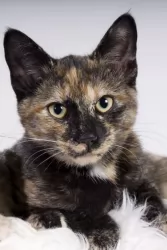 Tortoiseshell cats are your regular-sized cats. They can be medium-sized to large and weigh anything between 3 and 7kg.
Tortoiseshell cats are your regular-sized cats. They can be medium-sized to large and weigh anything between 3 and 7kg.
They come in different colors and patterns. The colors are essentially cream, fawn, black, tan, and orange. Tortoiseshell markings appear in all the different cat breeds.
Because the tortoiseshell cat is a color and not a cat breed as such they can be different sizes and shapes.
Tortoiseshell cats aren't a specific breed, but there are people that believe that just the color of the coat is indicative of the personality – feisty and lively.
People who have owned these cats say they have a sassy temperament and can even be just a wee bit aggressive sometimes with their strong-willed attitude.
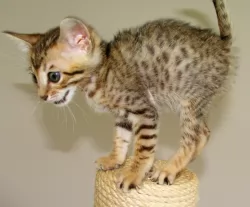 These are spotted cats with long legs and large, round-tipped ears. The neck is long and the body lithe, lean, and muscular.
These are spotted cats with long legs and large, round-tipped ears. The neck is long and the body lithe, lean, and muscular.
They are medium to large in size and can weigh up to 7 or 8kg. The coat is tan and cream with silver or grey coloring as well as black spots and stripes. Some Serengetis appear to be black but on closer look, you see that they have what is known as ‘ghost spotting’ – a black-spotted pattern that can scarcely be seen.
You may even think you are looking at a black panther. The coat is short, silky, smooth, and sleek. The eyes of the cat are round and are usually amber or gold.
The Serengeti is a friendly, social, and confident cat that is quite capable of forming a strong attachment to its human family. It is a loving, loyal cat. The cat can become bored and will need plenty of puzzle toys to keep his mind and body physically active.
You will need to provide him with a scratching post too as he is a lively, energetic cat. This isn’t only an indoor cat. Cats like the Serengeti will need an outdoor enclosure and the Serengeti cat will need branches and perches to leap up onto.
He is an active cat and can become bored if left indoors. They are capable of making a good family pet and are vocal too – telling you all sorts of things.
 Your Tortoiseshell is a beautiful cat and fondly referred to as a Tortie. It has a coat similar to the coloring of a tortoise, but the temperament of the cat will rely much on your own personality and the lifestyle you provide him with.
Your Tortoiseshell is a beautiful cat and fondly referred to as a Tortie. It has a coat similar to the coloring of a tortoise, but the temperament of the cat will rely much on your own personality and the lifestyle you provide him with.
They are fairly vocal, but because this cat isn't a breed but rather a coat color, nobody can say precisely how it will turn out in personality.
One thing is sure, if you offer your Tortoiseshell lots of love and care, you can be sure of a wonderful feline friend.
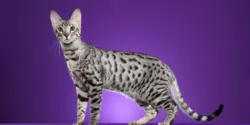 The Serengeti is both a friendly and affectionate cat even though he is a bit shy and overwhelmed in new surroundings.
The Serengeti is both a friendly and affectionate cat even though he is a bit shy and overwhelmed in new surroundings.
He is a cat that talks quite a bit and if he is happy and content he enjoys 'chatting' to you about his day.
He is able to get on well with children in the home as well as with other pets. He is an athletic cat and just loves to climb, and this is why he will certainly need an outdoor enclosure as he loves to dart around madly from time to time, and doing that in your home could be quite dangerous.
He is capable of being a loving cat breed and can form a strong bond with his human family.
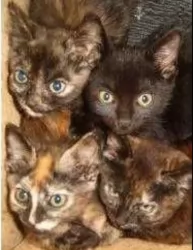 Your cat's health depends on good food. If your finances allow, choose a high-quality food. Check the label for the feeding guidelines.
Your cat's health depends on good food. If your finances allow, choose a high-quality food. Check the label for the feeding guidelines.
Always remember that your cat's age - kittens, adults, and senior cats have different nutritional needs. Sick cats will require a different type of food. Watch your cat's weight because being overweight can bring on a host of illnesses such as diabetes.
A cat has to have access to fresh drinking water every day and night to remain healthy.
Ensuring your feline friend is exercised both mentally and physically is important for good health.
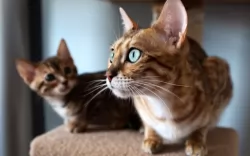 Hybrid Cats such as the Serengeti are a combination of a wild breed and a domestic breed. With good care he can live to be up to 15 years of age and possibly longer.
Hybrid Cats such as the Serengeti are a combination of a wild breed and a domestic breed. With good care he can live to be up to 15 years of age and possibly longer.
Hybrid cats are always controversial because people who have owned them have got both good and bad to say about them. They have some behavioral issues and many of them have an aggressive side, they’re aloof and they refuse to use a litter box. The cat can’t be blamed though because they have that wild side.
They also come with some health issues such as premature birth, miscarriage, diarrhea, and irritable bowel disease. You may just find yourself more often at the vet than you’d like.
You will need to ensure that your Serengeti gets all his vaccines and de-worming treatments.
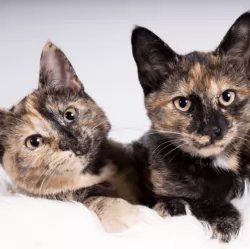 Cats are known to be independent but they still need your care and attention. Before you take a Tortoiseshell into your home, prepare for his arrival.
Cats are known to be independent but they still need your care and attention. Before you take a Tortoiseshell into your home, prepare for his arrival.
Make sure you have food and drinking bowls ready, a comfortable bed, a stylish cat collar and tag of identification, cat accessories such as a brush, toys, and some top-quality cat food.
If you work all day, maybe it would be a good idea to get 2 cats as some cats can get very lonely during the day, and adding a companion can be an excellent solution for his loneliness.
Always be in touch with the vet if you see that your cat isn’t behaving in his usual way.
Your cat will need to be taken for check-ups and also all the necessary cat vaccinations required to ward off deadly cat illnesses.
Provide your cat with a litter box and make sure you remove the cat feces every day.
Provide your cat with toys. Choose them carefully to keep your cat happy and amused. Buy a scratching post too as all cats want to scratch and you want to save your furniture from your cat using it to scratch on.
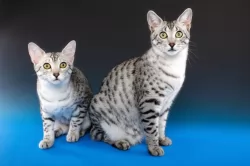 Grooming is easy for the Serengeti as it is a short-haired cat and will require a brush just once a week. Trimming the claws will also be necessary.
Grooming is easy for the Serengeti as it is a short-haired cat and will require a brush just once a week. Trimming the claws will also be necessary.
A cat such as the Serengeti has been developed by crossing the domestic cat with a wild breed. This means that there will be concerns with the temperament and behavior of these cats in a home setting. Apart from being allowed indoors, they will need an outside enclosure.
Having a wild side, while every cat is a carnivore, these cats are even more so. Their diet has to be strictly protein – meat. Wild cats would have a diet made up of birds and lizards. You want to avoid commercial cat foods that are of lower quality and have less meat in and more carbohydrates. This just spells ill health for your cat. Cats also need some fresh raw meat in their diets.
It is important to keep up your Serengeti's veterinary checkups to make sure there aren’t any health concerns.